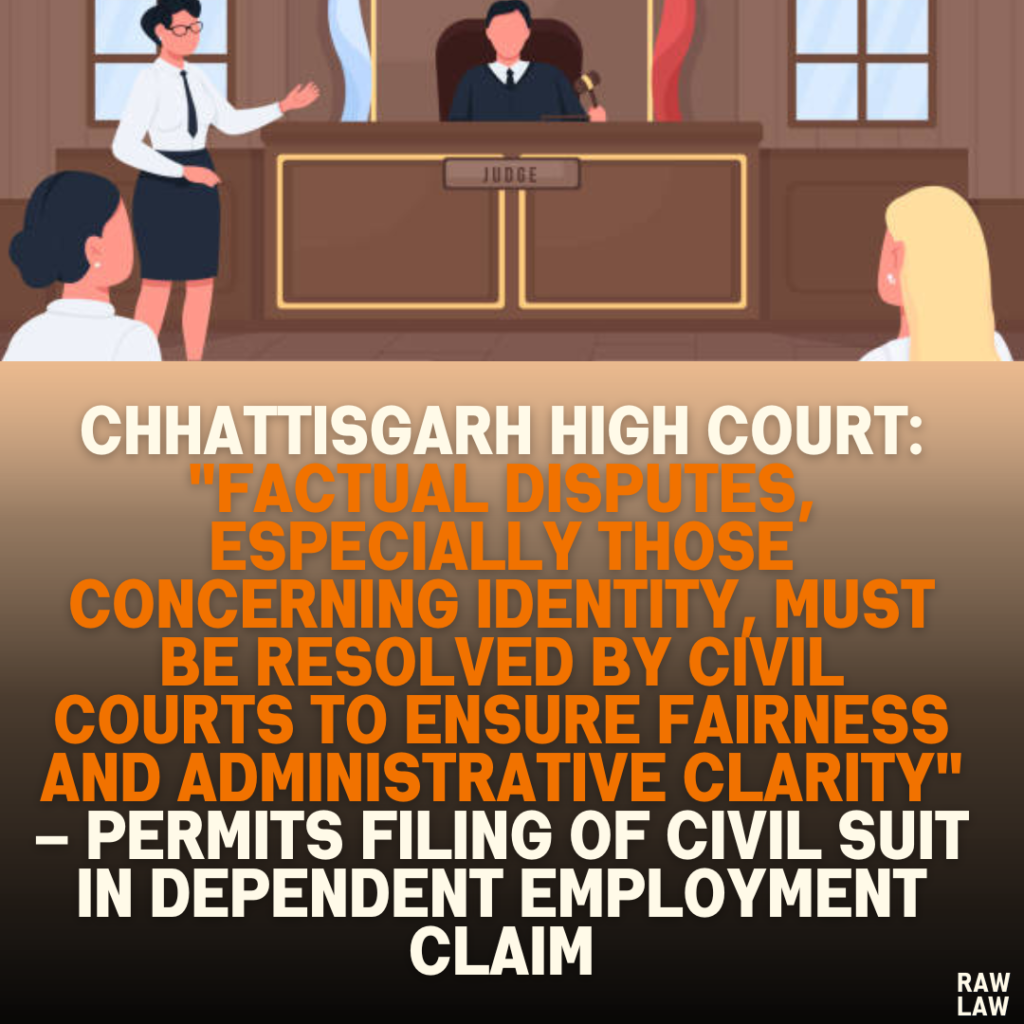Court’s Decision:
The Chhattisgarh High Court disposed of the petition with directions. It permitted the petitioner to file a civil suit seeking a declaration to resolve the identity dispute between the names “Sunila Singh” and “Indrakunwar Singh.” The court directed that, if the civil court issues a decree in the petitioner’s favor, the respondents must reconsider her claim for dependent employment under the National Coal Wages Agreement in an objective manner.
Facts:
- The petitioner’s father, an employee of South Eastern Coalfields Limited (SECL), passed away in harness on January 24, 2016.
- Seeking dependent employment as per Clause 9.3.0 of the National Coal Wages Agreement, the petitioner submitted an application on March 3, 2020.
- The application was rejected on the grounds that the petitioner’s age at the time of her father’s death was calculated as 37 years, exceeding the permissible limit of 35 years stipulated under the agreement.
- The petitioner contested this calculation, claiming that the respondents miscalculated her age and disregarded credible evidence, such as her Aadhaar card, Class 8 mark sheet, and birth certificate, which suggested she was under 35 years at the relevant time.
- Additionally, there was a dispute regarding the petitioner’s name, as some documents referred to her as “Sunila Singh” while others referred to her as “Indrakunwar Singh.” The respondents argued that there was no evidence to prove these names referred to the same individual.
Issues:
- Was the petitioner’s age correctly calculated for determining her eligibility for dependent employment?
- Could the petitioner establish that the names “Sunila Singh” and “Indrakunwar Singh” referred to the same individual, resolving the identity dispute?
Petitioner’s Arguments:
- Age Discrepancy: The petitioner argued that her age was miscalculated based on her father’s service record, where her age on August 11, 1987, was mentioned as four years. She presented alternative evidence, including her Aadhaar card, Class 8 mark sheet, and birth certificate, which indicated her age was under 35 years when her father passed away.
- Identity Issue: The petitioner asserted that the variation in her name across documents should not disqualify her. She maintained that “Sunila Singh” and “Indrakunwar Singh” were the same person, and the discrepancy arose due to inconsistent documentation.
Respondent’s Arguments:
- Service Record as Evidence: The respondents relied on the service record filled by the petitioner’s father, where her age was recorded as four years on August 11, 1987. Based on this, her age was calculated as 37 years at the time of her father’s death, exceeding the permissible limit.
- Name Discrepancy: The respondents argued that the petitioner failed to provide conclusive evidence proving that “Sunila Singh” and “Indrakunwar Singh” were the same person. They highlighted that the petitioner’s prior petition (WPS No. 9203 of 2022) was filed under the name “Sunila Singh,” while the current petition was filed as “Sunila Singh @ Indrakunwar Singh.”
- Documentary Variance: The respondents pointed out inconsistencies in the names used across different documents, such as her mark sheet and birth certificate, which did not conclusively link the two names.
Analysis of the Law:
- Dependent Employment Under Clause 9.3.0: The court emphasized that the National Coal Wages Agreement provides dependent employment to the eligible family members of deceased employees. However, eligibility is contingent on fulfilling requirements like age limits and unambiguous identity.
- Role of Civil Suits in Identity Disputes: The court highlighted that discrepancies in documentation, especially regarding identity, need to be resolved through civil proceedings. Only a decree from a civil court can provide the clarity required for administrative authorities to act objectively.
Precedent Analysis:
While the judgment did not cite specific precedents, it adhered to the principle that factual disputes, particularly those involving identity or documentation inconsistencies, should be conclusively resolved by a competent civil court before administrative remedies can be granted.
Court’s Reasoning:
- Identity Dispute: The court found that the petitioner had failed to provide conclusive evidence to prove that “Sunila Singh” and “Indrakunwar Singh” referred to the same individual. This unresolved dispute hindered the respondents’ ability to consider her eligibility for dependent employment.
- Age Miscalculation Allegation: While the petitioner presented alternative evidence regarding her age, the court deemed it necessary to resolve the identity issue first, as it was foundational to determining her eligibility.
- Need for Declaratory Relief: The court observed that only a decree from a civil court could resolve the identity dispute. Once this issue was resolved, the respondents could objectively consider the petitioner’s claim.
Conclusion:
The petition was disposed of with the following directions:
- The petitioner is permitted to file a civil suit to seek a declaratory judgment establishing that “Sunila Singh” and “Indrakunwar Singh” are the same individual.
- If the civil court passes a decree in the petitioner’s favor, the respondents are directed to objectively reconsider her application for dependent employment under Clause 9.3.0 of the National Coal Wages Agreement.
Implications:
- For Administrative Authorities: The judgment underscores the importance of clear and consistent documentation in evaluating claims for dependent employment. Administrative decisions must be based on unambiguous and verified information.
- For Claimants: The case highlights the necessity for claimants to ensure that their documentation is consistent and discrepancies are resolved through legal means, if necessary.
- Broader Legal Principle: The decision reinforces the role of civil courts in resolving factual disputes that impede administrative or employment claims, ensuring fairness and procedural clarity.




Pingback: Bombay High Court Grants Temporary Bail to Pregnant Woman Charged Under NDPS Act: "Delivering a Child in Jail Atmosphere Would Impact Both Mother and Child's Dignity" - Raw Law